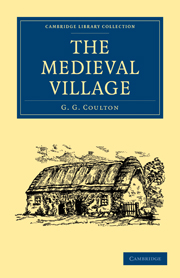Book contents
- Frontmatter
- GENERAL PREFACE
- AUTHOR'S PREFACE
- Contents
- LIST OF ILLUSTRATIONS
- ABBREVIATIONS AND AUTHORITIES
- CHAPTER I THE OPEN ROAD
- CHAPTER II VILLAGE DEVELOPMENT
- CHAPTER III A FEW CROSS-LIGHTS
- CHAPTER IV A GLASTONBURY MANOR
- CHAPTER V THE SPORTING CHANCE
- CHAPTER VI BANS AND MONOPOLIES
- CHAPTER VII THE MANOR COURT
- CHAPTER VIII LIFE ON A MONASTIC MANOR
- CHAPTER IX FATHERLY GOVERNMENT
- CHAPTER X THE LORD'S POWER
- CHAPTER XI EARLIER REVOLTS
- CHAPTER XII MONKS AND SERFS
- CHAPTER XIII THE CHANCES OF LIBERATION
- CHAPTER XIV LEGAL BARRIERS TO ENFRANCHISEMENT
- CHAPTER XV KINDLY CONCESSIONS
- CHAPTER XVI JUSTICE
- CHAPTER XVII CLEARINGS AND ENCLOSURES
- CHAPTER XVIII CHURCH ESTIMATES OF THE PEASANT
- CHAPTER XIX RELIGIOUS EDUCATION
- CHAPTER XX TITHES AND FRICTION
- CHAPTER XXI TITHES AND FRICTION (CONTINUED)
- CHAPTER XXII POVERTY UNADORNED
- CHAPTER XXIII LABOUR AND CONSIDERATION
- CHAPTER XXIV THE REBELLION OF THE POOR
- CHAPTER XXV THE REBELLION OF THE POOR (CONTINUED)
- CHAPTER XXVI THE DISSOLUTION OF THE MONASTERIES
- CHAPTER XXVII CONCLUSION
- APPENDIXES
- POSTSCRIPTS
- INDEX
- Plate section
CHAPTER XIX - RELIGIOUS EDUCATION
Published online by Cambridge University Press: 06 December 2010
- Frontmatter
- GENERAL PREFACE
- AUTHOR'S PREFACE
- Contents
- LIST OF ILLUSTRATIONS
- ABBREVIATIONS AND AUTHORITIES
- CHAPTER I THE OPEN ROAD
- CHAPTER II VILLAGE DEVELOPMENT
- CHAPTER III A FEW CROSS-LIGHTS
- CHAPTER IV A GLASTONBURY MANOR
- CHAPTER V THE SPORTING CHANCE
- CHAPTER VI BANS AND MONOPOLIES
- CHAPTER VII THE MANOR COURT
- CHAPTER VIII LIFE ON A MONASTIC MANOR
- CHAPTER IX FATHERLY GOVERNMENT
- CHAPTER X THE LORD'S POWER
- CHAPTER XI EARLIER REVOLTS
- CHAPTER XII MONKS AND SERFS
- CHAPTER XIII THE CHANCES OF LIBERATION
- CHAPTER XIV LEGAL BARRIERS TO ENFRANCHISEMENT
- CHAPTER XV KINDLY CONCESSIONS
- CHAPTER XVI JUSTICE
- CHAPTER XVII CLEARINGS AND ENCLOSURES
- CHAPTER XVIII CHURCH ESTIMATES OF THE PEASANT
- CHAPTER XIX RELIGIOUS EDUCATION
- CHAPTER XX TITHES AND FRICTION
- CHAPTER XXI TITHES AND FRICTION (CONTINUED)
- CHAPTER XXII POVERTY UNADORNED
- CHAPTER XXIII LABOUR AND CONSIDERATION
- CHAPTER XXIV THE REBELLION OF THE POOR
- CHAPTER XXV THE REBELLION OF THE POOR (CONTINUED)
- CHAPTER XXVI THE DISSOLUTION OF THE MONASTERIES
- CHAPTER XXVII CONCLUSION
- APPENDIXES
- POSTSCRIPTS
- INDEX
- Plate section
Summary
So Caliban is Caliban, and we cannot do very much with him so long as his main belief and trust rests upon Setebos. The land cannot be brought back to those who cannot master the land. St Thomas Aquinas never erred worse, perhaps, than when, following his master Aristotle, he judged the ideal state to need a peasantry strong in the arm, dull of intellect, and divided among themselves by mutual distrust. His contemporary, Berthold of Regensburg, a friar like himself, but a friar who knew the poor well, did here advance one full step beyond Aquinas; he saw the social evil clearly, though he did not foresee the social remedy. He lamented (as we have seen) the lack of peasant saints; he was under no illusions as to the present state of these countryfolk who, on an average, formed half his congregation; but he did see that the root of their misery lay in their disunion. In one of his sermons, he compares different classes with different animals:
These fish betoken the poor folk; for the fish is a very poor and naked beast; it is ever cold, and liveth ever in the water, and is naked and cold and bare of all graces. So are also the poor folk; they, too, are helpless. Wherefore the devils have set the bait for them that is called untruth, because they are poor and helpless; with no bait could the devil have taken so many of them as with this. […]
- Type
- Chapter
- Information
- The Medieval Village , pp. 253 - 278Publisher: Cambridge University PressPrint publication year: 2010First published in: 1925



